Iced!: The 2007 Journal of Nick Fitzmorgan
Read Iced!: The 2007 Journal of Nick Fitzmorgan Online
Authors: Bill Doyle

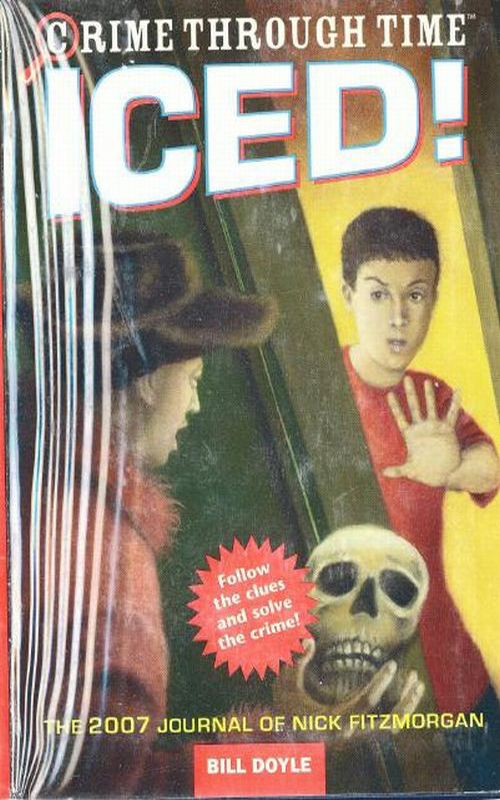
Photos:
p. 11
/Library of Congress;
pp. 33
,
71
/Ablestock;
p. 52
/Laura Miller;
p. 55
/L. C. Casterline;
p. 135
/Riccardo Salmona
The Inspector
photos: p. 1 (top) Corbis, (bottom) L. C. Casterline; p. 2 (top) Ablestock, (bottom)
KRT/Newscom; p. 3 (top) PR Newswire Photo Service/Newscom; (center right) Mario Ruiz/Zuma Press/Newscom; p. 4 (top right)
Worth Conoy/Icon SMI/Newscom, (top left) L. C. Casterline, (center left) PR Newswire Photo Service/Newscom
Text copyright © 2006 by Bill Doyle
Compilation, illustrations, and design copyright © 2006 by Nancy Hall, Inc.
Crime Through Time is a trademark of Nancy Hall, Inc.
Developed by Nancy Hall, Inc.
All rights reserved
Little, Brown and Company
Hachette Book Group
237 Park Avenue
New York, NY 10017
Visit our website at
www.HachetteBookGroup.com
First eBook Edition: September 2009
ISBN: 978-0-316-08457-4
Contents
A thank-you of historic proportions to Nancy Hall for making this book and the Crime Through Time series a reality. To Kirsten Hall for her insightful grasp of the overall picture, to Linda Falken for her skillful editing and amazing eagle-eye for detail, and to Atif Toor for bringing the books alive visually.
Special thanks to the editors at Little, Brown: Andrea Spooner, Jennifer Hunt, Phoebe Sorkin, and Rebekah Rush Mckay, who are always dead-on, always incisive, and never discouraging. And thanks to Riccardo Salmona for his constant support.
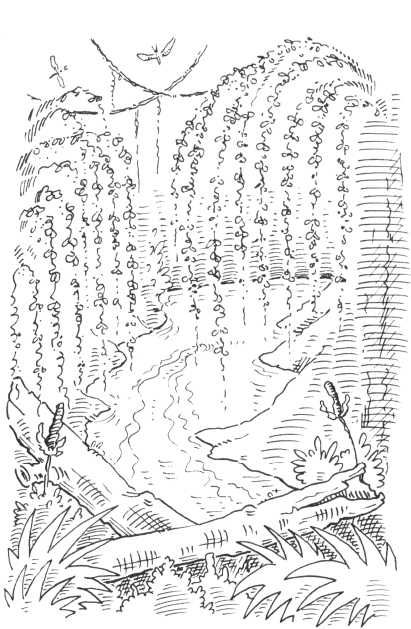
THE SWAMP
12:30 PM
I felt something slimy curl around my
ankle—and I froze.
Insects buzzed around my head, and the surrounding swamp gave off the sickening smell of rotten eggs. But I forced myself
to stay still. My legs were submerged in waist-high water, thick with muck. I had no idea what creature had wrapped itself
around my leg, and I didn’t want to startle it. For all I knew, it could be a friendly little snake—or it could be an angry
cottonmouth with really sharp fangs and dangerous venom. After a few tense moments under the sweltering sun, I felt the creature
uncoil. There was a tiny ripple on the grayish-brown surface as it slithered away.
I continued wading through the gunk, forcing myself not to hurry even though that unplanned stop might have cost me the mission.
This morning, I had been given specific instructions to trail the Suspect—and to do so without being spotted. Losing him in
the swamp would mean failure, and failure isn’t something I handle so well.
Around me, the swamp gurgled like something out of an old horror movie. Dead tree trunks sprouted up here and there. To my
left, the swamp was edged by massive weeping willows that blocked the sight of the nearby dirt road.
Could the Suspect have gone that way? I wondered.
As if to answer me, I heard the snap of a twig coming from the direction of the trees.
I ducked behind a hollowed-out tree trunk. I was just about to risk peering through a hole in the rotted trunk — when a hand
reached through and grabbed my shoulder. I jumped and let out a little yell.
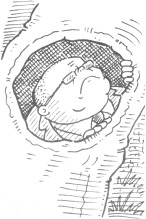
MR. BULLDOG
The hand released me. I looked through the hole and saw a pair of reflective sunglasses staring back at me. They were worn
by a guy who was in his late twenties and had a face like a bulldog. He had a crew cut so short it made him look almost bald,
and he was a wearing a dark suit. “Judge Pinkerton would like to see your,” Mr. Bulldog said in a gravelly voice.
I shook myself free of his hand and walked around to his side of the tree. Mr. Bulldog—a nickname the students had given him—was
one of the top detectives at the facility and an ace at moving with stealth. No wonder I hadn’t heard him. “I’m on a training
mission,” I told him.
“It’s been terminated,” he growled.
My stomach sank in disappointment. “But what about the Suspect?”
“Your training partner has been informed,” Mr. Bulldog replied over his shoulder. He was already walking back toward the dirt
road, knowing that I would follow. No one at the training facility would ignore a summons from Judge Pinkerton.
Passing through the line of trees, I found Mr. Bulldog sitting in the driver’s seat of a souped-up golf cart, which was part
ATV, part lunar rover. The huge, balloon-like wheels and the flexible axles could handle the rocky terrain in the area. The
cart could cruise easily over fallen trees that might block the road.
After shaking off as much of the muck from my jeans as I could, I hopped into the passenger seat. Mr. Bulldog drove us along
the dirt road that wound its way through the 600-acre Private Detective Academy. Spread over a landscape of mountains, forests,
clearings, and a swamp, PDA was like a small town.
PDA
P
RIVATE
D
ETECTIVE
A
CADEMY
But to live in this town, you had to want to be a detective—and you had to be eighteen or older. Of course, that isn’t true
in my case. I just turned fourteen last month. Judge Pinkerton, who started PDA, had made an exception in my case and let
me attend a special four-week training program.
For the past three weeks, I’d been part of a kind of detective boot camp. Each day started at six in the morning with a four-mile
run, followed by training exercises, classroom instruction—including stuff on forensics (my favorite!)—and more training exercises.
Not exactly what most kids would do on summer break, but I was happier than I could remember. Even though at first, my chest
had burned during the outdoor training. Surrounded by mountains, PDA was several thousand feet above sea level, and my lungs
had struggled to suck oxygen out of the high-altitude air. But after a few days, I’d made the adjustment.
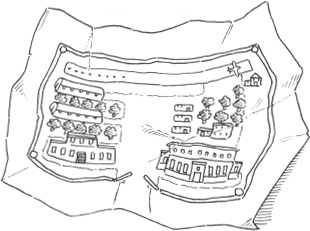
PDA HEADQUARTERS
To my surprise, we didn’t go back to the main building that held the facility’s offices. Instead, we headed in the opposite
direction, straight to the private airstrip. There, I spotted a sleek Learjet on the tarmac, its idling engines whining.
We pulled up next to the plane. Judge Pinkerton stood waiting for us, her purple silk scarf and silver hair blowing in the
breeze. Judge was an old friend of both the Fitzmorgans and the Moories, the two branches of my family.
WORLD’S FIRST PRIVATE EYE
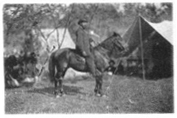
Allan Pinkerton was born in Glasgow, Scotland. In 1842, he immigrated to the United States, where he settled in Chicago, Illinois.
After helping round up a gang of counterfeiters, Pinkerton became a deputy sheriff and then Chicago’s first detective. In
1850, he founded the first private detective agency and, while working for a railroad company, he became friends with attorney
Abraham Lincoln. In 1860, it was Pinkerton who prevented president-elect Lincoln from being assassinated. At Lincoln’s request,
Pinkerton formed a secret service to spy on the South for the Union.
JUDGE IS A PINKERTON
Looking at Judge, it’s easy to forget that she’s over a hundred years old. Her back is still straight and she’s nearly six
feet tall. Unlike other older people I know, the skin on her face didn’t sag with age. It just thinned slightly and grew tighter
over her high cheekbones. The only heavy wrinkles were the laugh lines around her mouth and eyes. Judge used a cane made of
strong driftwood, a gift from Uncle Mal, but she could still get around pretty well. And her bright blue eyes had never lost
their intensity.
